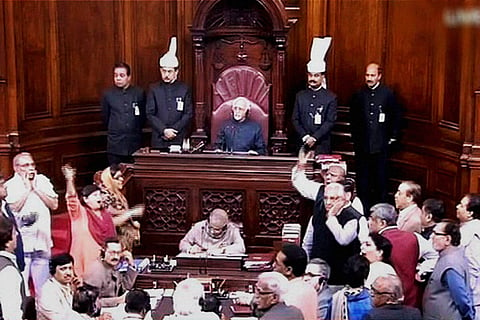

The BJP has won most of the 15 Rajya Sabha seats for which polls were conducted on Tuesday, with several MLAs cross-voting and pushing the opposition further to the brink ahead of the Lok Sabha elections.
The saffron party surprisingly won the single seat on offer in Himachal Pradesh, shocking the Congress, which has a significant majority of 40 MLAs against the BJP’s 25 in the 68-member Assembly. At least six Congress MLAs and three Independents are believed to have voted in favor of the BJP, ensuring the big win.
Similarly, the BJP won eight out of ten seats in UP, again through cross-voting from Samajwadi Party MLAs, thereby causing havoc in the state’s opposition with the SP’s chief whip Manoj Pandey quitting amid the polls.
The situation was different in Karnataka, where BJP MLA S T Somashekar voted in favor of Congress candidate Ajay Maken while another MLA of the saffron party, A Shivaram Hebbar, abstained from voting. However, Maken did not need Somashekar’s vote, and would have qualified for the seat without the BJP MLA’s support.
Somashekar said he listened to the "voice of his conscience" and voted in favor of the Congress "which built schools and carried out developmental works in his constituency", reported The Economic Times.
The Congress won three out of four seats in Karnataka, with BJP’s Narayansa K Bhandage being the exception.
The upper house of the Indian parliament will have a total of 240 seats after the newly elected members are sworn in. Of these, six members are nominated by the President. The remaining 234 seats are filled at the rate of one-third every two years, giving each member a six-year tenure.
With the latest results, of the 56 seats that fell vacant in April, the BJP has won 30, including 20 seats it won unopposed from different assemblies. Other NDA constituents together won three seats (one each for Ajit Pawar’s NCP, Shiv Sena and JDU).
The Congress won nine seats while other opposition parties won a total of 12 seats. This includes the Trinamool Congress (4), YSR Congress (3), RJD (2), BJD (2) and BRS (1).
The upshot of the elections is that the BJP has now increased its total tally in India’s upper house from 93 to 97, and the NDA alliance from 109 to 117.
Significance of the win in Rajya Sabha
The win in Rajya Sabha – despite exposing the BJP to charges of buying legislators – is critical to the party’s ambitious plans to bring about changes to India’s Constitution.
This is because the Rajya Sabha serves as a ‘check and balance’ on the power of the lower house, the Lok Sabha, which is already dominated by the ruling alliance.
According to the Constitution, consent of the Rajya Sabha is required for certain legislative proposals that affect the states, such as creating a new state, changing state boundaries, imposing President's rule in a state, etc.
Similarly, any constitutional amendment bill must be passed by a special majority of both houses -- a two-thirds majority of those present and voting in the Rajya Sabha and Lok Sabha in a joint sitting. The body thus makes the amendment process more consultative, deliberate and ensures checks and balances that enhance the stability of the Indian Constitution over time.
Also, the Rajya Sabha is a permanent house, unlike the Lok Sabha which can be dissolved.
To bring in game changing bills like the ones seeking delimitation in the Lok Sabha, Uniform Civil Code and CAA, the BJP needs an unbeatable voice at the upper house.
Implementation of the UCC would require amendments to Article 44 as well as other religious freedom provisions in the constitution. This needs approval from the Rajya Sabha which is difficult to attain with many contesting voices.
Another controversial bill is the CAA. It seeks to redefine the provisions for citizenship based on religion. Critics allege that it violates articles 15 and 16 which grants neutrality of the state with respect to religion and articles 25, 26, 27 and 28 which grants freedom of religion.
The saffron party alliance has also been pushing for a ‘One Nation- One Election’ policy which would synchronize the elections at the Centre and state. This would require several changes to be made to the federal provisions laid out in the Constitution, and the assent of not just the Rajya Sabha, but also 50% of the states.
Though the BJP has successfully passed several bills even when it lacked a majority in the Rajya Sabha, now the path seems to be smoother.